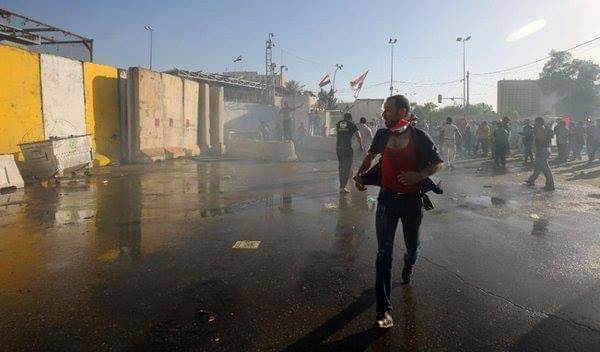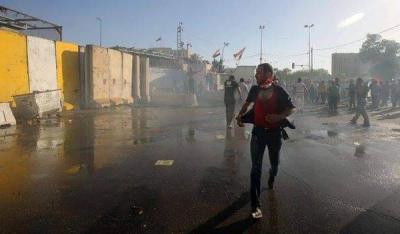Recent events in Iraq have dominated the regional and international political landscape, with images of military clashes in the Green Zone in central Baghdad between Shiite factions loyal to Shiite cleric Muqtada al-Sadr and some Iran-affiliated Popular Mobilization Forces taking the headline in Arab and international media. This marks a dangerous indicator that could push Iraq back into the throes of civil war, following months of political deadlock in the country, failed attempts to elect a president, and form a new government due to the intransigence of Sadr's rivals from the Iran-aligned "Coordination Framework," who refused to acknowledge the results of the parliamentary elections won by Sadr and his allies.
While Sadr's positions and various initiatives have been the focal point of political activity in recent months, he has presented two contradictory faces: a maximum push towards change and reform through peaceful action, and then his announcement of a complete withdrawal from political life, as he stated in a tweet, "Retiring from political work and closing the offices affiliated with my movement." What occurred in recent days does not provide a direct answer as to whether the Sadrists will continue their struggle against other Shiite factions loyal to Iran in new forms, maintain a level of consistency in their positions, or opt for total withdrawal, as the young leader announced prior to the escalation in the Green Zone. He called on his supporters to withdraw entirely from the confrontations that occurred between them and other Iran-affiliated Shiite factions and security forces, which resulted in 23 fatalities.
After declaring that "the country is hostage to corruption and violence," Sadr added, "I will disown my supporters if they do not withdraw from the sit-in within an hour." It is certain that the calculations of gains and losses pushed Sadr to halt the bloodshed, prevent sliding into armed conflict, and withdraw from the scene after receiving information from within the Coordination Framework allied with Iran about the formation of an operations room comprising representatives of the Revolutionary Guard along with leaders of certain Popular Mobilization Forces, outlining a comprehensive target bank for weapons depots and headquarters of Sadr’s supporters and besieging them from various angles. This message reflects the Revolutionary Guard's desire to undermine Sadr's role and influence in the Iraqi arena.
Since February, Sadr has taken a series of stances to address the parliamentary crisis, rejecting compliance with Iranian orders, declaring in various forms that he is Iraqi and Arab, and that he does not want any Iranian interference in the establishment of political power in Iraq. He has supported these positions with direct relations with the United Arab Emirates and the Kingdom of Saudi Arabia, strongly backing the government's position of Mustafa al-Kadhimi in his attempts to open up to both Cairo and Amman, as well as Riyadh, which has had significant influence on internal Iraqi affairs.
Undoubtedly, the recent events have compelled political factions in Iraq to reassess their calculations and future directions and how to manage the crisis. The withdrawal of Sadr and his stance made it undeniably clear that the Iran-affiliated Popular Mobilization Forces do not hesitate to open fire on Iraqis and threaten a Shiite-Shiite war, forcing their opponents to retreat, whether they are Sadrists, Sunnis, or Kurds, under the threat of igniting civil war and compelling them to make concessions.
Thus, based on the developments on the ground and behind the scenes, two significant issues must be pointed out:
1. **Iran Lacks a Unified Policy in Iraq**: Information indicates that the Revolutionary Guard is operating in one direction, the Iranian embassy in Baghdad is acting in another, and the old Iranian security apparatus (SAVAK) is functioning in a third. Consequently, the idea of unifying efforts among Iran-aligned factions under an organized policy and regular rhythm has become difficult due to Iran's inability to manage the conflict as it previously did, as well as the multiplicity of Iranian field decision-making sources. Recent events revealed that a faction of the Popular Mobilization Forces, led by Hadi al-Amiri, does not want to enter the war against the Sadrists, and a part of the Iranian embassy in Baghdad alerted Sadr to the Revolutionary Guard’s plan to attack his movement's centers and institutions in Iraq. This may also serve as a role distribution to keep the Iraqi arena subject to local crises linked to Iran.
2. **US Interest in Iraq Remains Limited**: The level of American interest has not matched the nature of the Iraqi event, contenting itself with diplomatic signals resembling advice akin to that of the United Nations and international organizations. Some American opinions view Muqtada al-Sadr as a betting horse on reducing Iranian influence in Iraq, yet this has not translated into any impactful or substantial policy. Despite the rising pace of events and the escalating Sadr campaign and peaceful mobilizations, the White House has not shown any significant movement concerning the Iraqi file and has not proposed any initiatives or sent representatives to discuss Iraq’s situation based on American priorities and psychological withdrawal from political role in Middle Eastern issues.
Whether a US-Iranian agreement on the nuclear file is signed or not, the overall assessment of ongoing events suggests that Iran is headed for greater escalation in the Middle East. This escalation has somewhat clashed with different calculations in Iraq, as the Sadr movement has emerged preemptively against Iran rather than vice versa. Thus, while Iran may be ready for escalation, in Iraq it has adopted a defensive and disorganized stance, which can be leveraged in several other arenas, allowing for the initiative no longer to rest solely in Tehran's hands. When local forces operate on a cohesive agenda against Tehran, they can change the equation, and Iraqi experience shows that internal factors play a major role in reclaiming the initiative from the Iranians and pushing them to seek solutions from a defensive position.
Despite dealing with the Iraqi event through a regional lens, the accumulation resulting from Prime Minister Mustafa al-Kadhimi's policies in relations with Egypt, Saudi Arabia, Jordan, the UAE, and Bahrain has opened avenues for any Iraqi sentiment seeking liberation from Iranian hegemony and reconstructing an Iraqi identity as a national identity befitting a rich and authentic people in their homeland, endowed with resources that make them sovereign, free, and independent. Therefore, the current Iraqi event is a foundational one in the coming period and in the struggle between the countries of the Arab moderation axis and Iran, which aims not only to enrich nuclear uranium but also to enrich the sectarian Shiite situation in Arab countries as a condition subordinate to it, in confrontation with the logic of history, geography, and Arab identity, and facing the logic of national identity of each state.




